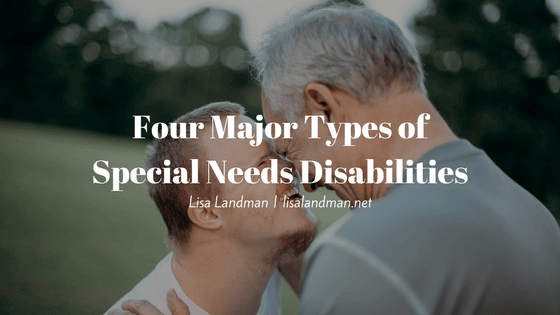According to the National Center for Education Statistics, a study conducted in 2015 found that over 6.6 million children have some type of special needs. While every child is different, the following are four major types of special needs children.
Physical
I.e., Muscular Dystrophy, Epilepsy, Cerebral Palsy
A physical special needs disability is any condition that prevents normal body movement and control. While there are many different types of physical disabilities, muscular dystrophy and cerebral palsy are common. A child with muscular dystrophy will have weakened muscle fibers while a child with cerebral palsy will have brain damage. There are many causes of physical disabilities and include genetics, serious illness, spinal cord injury and brain damage.
Developmental
Autism, Down Syndrome, Fragile X Syndrome
Developmental disabilities are generally detected early on because mental or physical impairments cause these disabilities. Common developmental disabilities are down syndrome and fragile x syndrome. Those who have down syndrome are born with an extra copy of chromosome 21, which affects brain and body development. Fragile X is another developmental disability that is thought to cause autism in boys.
Behavioral or Emotional
ADD, Bipolarized, Oppositional Defiant Disorder
A behavioral or emotional disability has many possible characteristics. Many include an inability to build or maintain interpersonal relationships, an inability to learn, and feelings of depression or anxiety. ADD is one common behavioral disability, which includes symptoms of inattentiveness, hyperactivity, and impulsivity. Bipolar disorder is a common emotional disability, which includes symptoms of depression, irritability, and distractibility.
Sensory Impaired
Deaf or Limited Hearing, Blind or Visually Impaired
Sensory impairment disabilities are when one of the senses (sight, hearing, smell, touch, taste, spatial awareness) is not at the average functioning level. Common disabilities include limited hearing or visual impairment. While injury and infection can cause sensory impairment, genetics can also play a role.
Many children (and adults) have some type of special needs disability. The four major types of disabilities include physical, developmental, behavioral or emotional, and sensory impaired disorders. While many disabilities fall under one of these four umbrellas, many can fall under two or more.
Lisa Landman has a passion for helping others and has worked with special need adults throughout her career. Learn more about her professional work or check out her Twitter!


